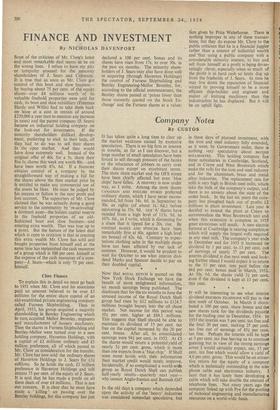Company Notes
By CUSTOS
IT has taken quite a long time to clear up the market weakness caused by excessive speculation. There is no big firm or interest in trouble, as far as I can discover, but a large number of small speculators have been forced to sell through pressure of the banks or the reluctance of jobbers to carry over their shares except on exorbitant terms. The store share market and the OFS mines have been chiefly affected but even 'blue chips' have fallen. A recovery is now under way, as I write. Among the store shares CANADIAN AND ENGLISH STORES preferred ordinary shares, which I have never recom- mended, fell from 54s. 6d. in September to 30s, ex rights (of about ls. 6d.) before recovering to 33s. 9d. Gus 'A' shares have receded from a high level of 115s. 9d. to 107s. 6d., as I write, which is distressing for a share that is tipped for a 20s. rise. By Contrast MARKS AND SPENCER have been remarkably firm at 60s. against a high level (ex bonus) of 62s. 6d. Contrary to expec- tations clothing sales in the multiple shops have- not been affected by our lack of summer. However, it would be prudent to wait for October to see what interim divi- dend Marks and Spencer decide to pay on their doubled capital.
• • •
Now that ROYAL DUTCH is quoted on ate New York Stock Exchange we have the benefit of more enlightened information, six month earnings being published. The disclosure that for the six months to June the untaxed income of the Royal Dutch Shell group had risen by £12 millions to £124.7 millions brought buyers into the oil share market. Net income for this period was 101 per cent. higher at £69.1 millions. This suggests that Shell should be able to maintain its dividend of 15 per ,cent. tax free on the capital increased by the 20 per cent. bonus. After all, its consolidated earnings were 941 per cent. in 1953. At £5 the shares would return a potential yield of nearly 51 per cent. gross, which is more than one expects from a 'blue chip.' If Shell were more lavish with their information their market credit would surely improve. Incidentally, if so complicated a world-wide group as Royal Dutch Shell can publish half-yearly results—quarterly next year—
why cannot Anglo-Iranian and Burmah Oil? • • IN the old days a company which depended upon the activity of the 'heavy' industries was considered somewhat speculative, but
in these days of planned investment, with the iron and steel industry fully extended, as it were, by Government order, there is nothing very speculative about BRIIISH ROLLMAKERS. This holding company has three subsidiaries in Coatbridge, Scotland, and in Crewe and West Bromwich which make the rolls for the iron and steel industry and for the aluminium, brass and metal alloy industries. The replacement rate for rolls is very high in British steel mills, which take the bulk of the company's output, and there is no anxiety about the state of the order book. In the last six years the com- pany has ploughed back out of profits £2 millions in plant investment. Last year it decided to extend the plant at Crewe to accommodate the West Bromwich unit and when this extension is complete in 1955 great economies will result, A new electric furnace at Coatbridge is nearing completion
which will supply the largest rolls required in any steel mill. The company's year ends in December and for 1953 it increased its dividend by 1 per cent. to 13 per cent, out of earnings of nearly 37 per cent. The interim dividend is due next week and look- ing further ahead I would expect it to return to the 15 per cent. rate paid before the 661 per cent. bonus paid 'in March, 1952. At 50s. 6d. the shares yield 51 per cent. even if the dividend is kept at 13 per cent. this year. • • •
IT will be interesting to see what interim dividend ERICSSON TELEPHONE will pay in the first week of October. In March it distri- buted a 100 per cent. share bonus and the new shares rank for the dividends payable for the trading year to December, 1954. In 1953 the interim was 5 per cent, tax free and the final 20 per cent, making 25 per cent. tax free out of earnings of 851 per cent. tax free. Perhaps the interim will be kepi at 5 per cent. tax free leaving us to continua guessing but in view of the strong earnings cover I would certainly expect, say, 15 pet cent, tax free which would allow a yield ol 4.6 per cent. gross. This would be an attract tive return for the equity of a company which is technically outstanding in the tele. phone cable and electronics industry. I hear that it has lately been developing s cable which will take double the amount ol telephone lines. Not many years ago du company linked up with Pye for the pooling of technical engineering and manufacturini resources on a world-wide basis.


































 Previous page
Previous page